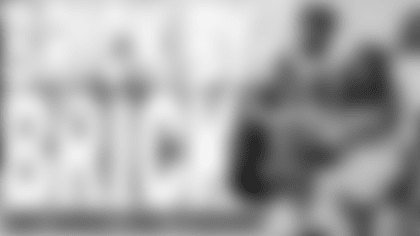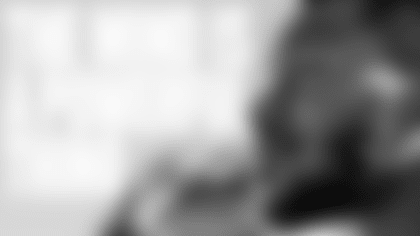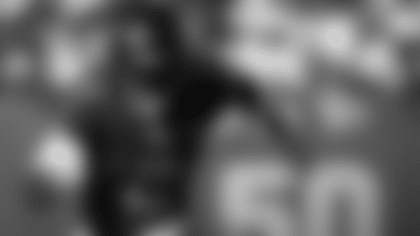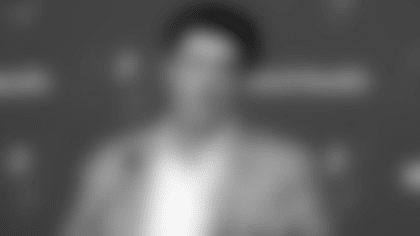What comes to mind when you think of the word autism?
For many, it is deficiency, disorder, impediment. These are limiting generalizations that have become synonymous with Autism Spectrum Disorder (ASD), shaping a narrowed worldview. The public understanding of autism, a lifelong neurological difference of varying severity that affects social interaction and communication, is often built on stereotypes. No two people on the spectrum are alike, yet atypical individuals are placed under a stigma with a preconceived list of symptoms. Because those on the spectrum do not comply to a "cultural norm," they are pushed to the edge of society and subject to discrimination. Autism is not a problem to be solved or a deficiency to be treated, but a difference to be valued and accepted. ASD is not the antagonist; intolerance and ignorance are.
"The more knowledgeable people are about autism, the more it will start to change," Buccaneers Head Coach Todd Bowles reflected as he swiveled in his chair. "Most people think it is a physical disease and it is not; It is more mental than it is physical. Some get stuck and are probably four or five years behind mentally where they should be, but I do not think enough people are educated among that and understand what autism is. I think Rain Man became the closest to it so to speak, in its own way, but there are people who have physical problems. For others, it is just mental. It is a different ability, and you learn how to adapt to that ability."
For Todd Bowles and his wife, Taneka, the gravity of the word autism became reality in 2013, knocking their family life off its axis. Their son, Tyson, was not responding as expected at two years old. He did not make eye contact nor speak, which led to an audiologist appointment. Once the audiologist confirmed his ears were working properly, a meeting with a pediatrician followed suit. After certain milestone boxes were not checked, Todd and Taneka ventured to a pediatric neurologist with Tyson. There, the developmental question marks were given a name: autism. Tyson was officially diagnosed, prompting disillusionment. In that moment, a contrived tragedy dispelled aspirations of who their son could be.
"Tyson had the blessing of oblivion," Taneka recalled. "He did not understand what I was being told but I understood that there was a lot of weight with this. This was something that was going to be a part of and if not, reshape all of our lives. So, in that moment, I am just going to be honest, I was depressed. I decided that I was going to shut the world out and I was going to live in a bubble, and it would just be us, with me and Tyson forever, because that felt like a safe place. There was the ignorance of me not really understanding what it was and me basing autism on a person who I saw that was nonverbal at 20 years old that could not function – the worst-case scenario."
A few months later, another change occurred. This one physically uprooted the Bowles family to a new destination. Todd, who had served as the interim defensive coordinator and secondary coach for the Philadelphia Eagles, was let go. What could have been a breaking point for the Bowles family turned into a faith-based perspective shift. The move not only led to a new address, but a new frame of mind amidst the confusion. In the transition, Todd and Taneka let go of the fight and suppressed thoughts over what the mind rigidly envisioned would be. They embraced an uncertain reality, courageously pushing forward.
"Really, we got blessed to be fired three months later," Taneka assessed. "So, we were really only in Philly for eight months. We got there, got the diagnosis and were out of there three months later. So, I spent those last three months in the house being depressed. Watching every movie made and trying to say to myself, 'The doctor was wrong.' Anything, but the right thing. But we got fired and I am blessed that God changed our geography. In that, it changed my mindset. You know, you are in a different environment, and you are open now. I had to go look for houses and I had to go look for schools for Tyson. I had to make sure I found a therapist and moving to Arizona was probably one of the best things that happened. Once we got there and I put him into a daycare center that was inclusive, Tyson had the best teacher.
"Vernetta Madsen did not specialize in kids with disabilities, she just had a big heart. But that is all it takes sometimes, especially when they are that young and there is not a huge academic component to nursery school. So, he felt the love from his peers, and he felt the love from that lady. He still was nonverbal, but I just wanted him to start getting social cues to be around other people. I knew that sitting in the house every day for the rest of his life being depressed could not be the plan. He really thrived there but I did not have him on a huge therapy plan. That period was just me learning to get our feet wet and letting him be gone for half the day."
That newfound outlook paved the way for the tumultuous journey ahead, with each day bringing a task of its own. Sixteen months later, another obstacle arrived. After serving as the defensive coordinator for the Arizona Cardinals for two seasons, Todd took a head coaching role with the New York Jets, switching to the AFC East. The coaching gig landed the Bowles' family in the hub of autism research around the globe, optimizing growth. There, in a functional environment that catered to Tyson's learning style, an unexpected miracle happened. On an unassuming day during a parent-teacher conference, light pierced through darkness. Time stood still and through tear-streaked faces, hope abounded.
"The New York/New Jersey area is the epicenter for autism research and development in the nation," Taneka stated. "People actually move from Europe to North Jersey because they have the best schools, they have the best research, they have the best studies, they have the best everything and it all fell into our lap. So, he gets to this learning center called The Uncommon Thread (TUT). I decided it was getting to the point where it was time for him to get ready for school. So instead of sending him to daycare, I was sending him to a learning center for autism. So, at Uncommon Thread, it is all about connections. These therapists are trying to build relationships because once they trust you, they will be willing to try new things. Tyson still was not talking. Todd and I went to a parent-teacher conference, and it wasn't the typical parent-teacher conference. It is when you sit there with the director of the learning center, and you watch your kid on a monitor in their regular therapy sessions. Tyson was talking and we had no idea! We got to hear our son's voice for the first time, and I cannot even verbalize to you what that moment meant for both of us. Because there was an ability there. Once we saw that part was possible, I pushed Tyson so hard after that.

"His first words were animals. It wasn't mom, it wasn't dad, it wasn't any of that. So, funny enough, Todd goes back to work, and I get Tyson in the car. Normally, I did not try to hold a conversation with him because I know it was frustrating for him not to be able to talk and the last thing you want to do is try and force someone to do something they are not capable of. But then, it was like, 'Now I know you can talk.' So, I said, 'Oh my goodness, what is that?' He said, 'Bird.' We were not talking but I could hear his voice. So, anything we watched, I would say, 'What is that?' He would say, 'Elephant.' I would say, 'Elephants are big.' Can you say, 'Big?' Then he would say, 'Big.' So, we had to start as if he was one year old. Over the years, he just blossomed. We just kept adding new dimensions into his life and once he trusted, he would add new things."
The seemingly insurmountable feat became possible. Tyson's speech sparked determination. With every word he spoke, Tyson shattered the prejudged parameters that were placed on him due to the diagnosis.
Bird
Tree
Giraffe
Tall
Elephant
Big
"From where he came to where he is at, you would never believe it," Todd smiled. "He learns it differently, so you have to teach it differently. He does not get the normal conversation borders, but he understands. He is the nicest kid in the world, and you just have to make sure that no one takes advantage of him. He can be too kind to a fault sometimes and it is just a process every day."
For every 'no' that the Bowles family received from countless doctors, they created a maybe, if not a yes for their son. After taking significant strides forward in New York within the epicenter for autism, another move ensued which landed the Bowles' family in Tampa, Florida. This time, they were determined to create a personalized environment for Tyson, one to cultivate learning. Taneka sent Danielle Tracy Ethier, Tyson's BCBA (Board Certified Behavior Analyst), to Tampa for a week to scout out the school system and landscape in relation to autism. After hitting a dead end, Todd and Taneka decided to enroll Tyson at a private Christian school, West Gate Christian School. There, they could custom-tailor Tyson's day to complement his unique sensory processing.
Taneka hired a paraprofessional, Wendy Johnson, to be his advocate on a daily basis at West Gate. She currently works alongside Tyson's teachers to translate information for Tyson with an understanding of sensitivity to sensory input, taking neurodiversity into account so he can work alongside his peers. Now, Tyson operates in an environment customized by his speech therapist, his behaviorist and occupational therapist, which has helped enhance his cognitive receptivity. He may operate at a different pace but is able to be his most authentic self, breaking the one-size-fits-all confinement.
"Our road has not always been easy but thank God we have always had our village surrounding us whether it is family or friends or therapists or teachers or anything," Taneka stressed. "They [West Gate] have allowed us to customize but this is an anomaly. This never gets to happen for the average kid on the spectrum, so we are blessed. What has happened here in Tampa that did not happen in New York is, he is like everybody's best friend. Tyson has become so popular now because he is the kid who does not judge. He is the kid who just wants to have fun and is the kid who also does not realize there is something different about him. He thinks there is something wrong with all of us, which I think is great."
As the Bowles see it, Tyson does not feel sorry for himself so why should anyone else? They know he has as much to offer the world as any other person. Because those with autism do not fit into a stereotypical box, they risk being bullied and labeled as impaired, often deprived of contributions. However, differences – including variations to the human brain – are what make the world spectacular. Value should not be placed on uniformity but on originality.
"It may sound strange, but I do not know if I would want Tyson any other way," Taneka stated. "He is so unique, and he is so special, and he is so motivated and so genuine, and that innocence is still there – I love that about him. We had to sit Tyson down and tell him about autism. It was one of those, When and how do you do it? How did we want to present autism to him? We do not want to put a negative spin on it so we said, 'Tyson, there is something that is different about you than other people and we explained to him and asked him questions to see if he could verbalize how he felt when he couldn't talk and he said, 'Angry. I was angry a lot. I was mad.' So, we went back to, 'This is what that is called. The reason why you couldn't communicate for so long was because of this one word, but you are talking now and walking (because he didn't walk until he was three), and you are doing so great with this one thing. It is something that is always going to be in your heart and something that is always going to be a part of you, but it is also something that makes you special in other ways.'
"We framed it as, 'Why would you want it to be gone because this is why you do this so well and that so well.' We put a positive spin on it and now he wears autism like a Superman cape. He turns his limits into lemonade all the time. The main thing we prioritized was telling him that, 'As long as you maintain your relationship with God, He is the one that is making sure you can get through this. He is the reason why you can talk now.'"

Growing up, Tyson has formed an incomparable bond with his father, Todd. To him, the stoic man who wears the headset on the sideline is simply, "dad." The inseparable duo has a routine that mimics the classic 1993 movie, Groundhog Day. Every morning like clockwork, Tyson calls Todd on his way to school. In the evenings, the besties sit on the couch together watching a myriad of shows: Friends, NCIS, Two and a Half Men and sports. The pair are Joey and Chandler on the Barcalounger personified, eating dinner on TV trays until it is time to get ready for bed. Then bursting with laughter, Tyson and Todd brush their teeth together. On Friday's, when Todd is able to leave work early, he takes Tyson for a special treat – fries and a milkshake at McDonald's.
During the Bucs' up-and-down season on the gridiron in 2022, Tyson made it his mission to cheer up daddy on the car ride following home games at Raymond James Stadium. He was the ray of sunshine that would not allow anyone to be sad after a loss. Tyson always beamed with pride no matter the score and manifested positivity, forcing his parents to do the same. Tyson became a blessing in disguise and like always, brightened the room by his contagious presence.
"I have heard people say that if you want to see the 'nice' Coach Bowles, you go to him around 7:20 a.m. because that is when he has just had his morning conversation with Tyson," Taneka exclaimed. "So, if he is really digging into somebody and his phone rings, it's 'Oh, hey man how's it going?' And when he gets off the phone, there is the softest side of Todd – it doesn't last very long - but there is that part of the morning. From the time Todd gets home from work until they go to bed, Tyson is selfish enough to believe that time all belongs to him. That is his best friend in so many ways and I love to see that relationship, because we were told what everybody was told: 'Your kid is not going to be social. They are not going to make eye contact.'

"None of us would be who we are without him. God made him for us. We feel that way and we know it. Todd even says it, he knows he wouldn't be the person he is if he wasn't Tyson's dad. We get things like this happen because God has a calling on us and has a higher purpose for us and we are here to serve that first and foremost. He has two older brothers [Todd Bowles Jr. and Troy Bowles] who love him so much. They take so much time with him and if he wants to go to the mall with them, he can go. If he wants to go to the movies with them, he can. They let him hang out and all their friends like him so much because he really is a cool kid."
Despite living in a world that tried to make a predetermined conclusion of what he can and cannot excel at, Tyson continues to defy the odds stacked against him. He is the antithesis of the autism stigma. Science only goes so far, and then comes God. Tyson breaks barriers and silences preconceptions about neurodiversity. He continues to take "can't" out of the vocabulary in connection to his ASD.
Tyson can speak.
Tyson is patient.
Tyson is athletic.
Tyson is a social butterfly.
Tyson has mental focus.
Tyson has a sense of humor.
"I think most people when they hear it, they think it is a physical disease and it's not," Todd assessed. "It is more mental than it is physical. They learn differently but they are just as smart, if not smarter. Tyson makes a lot of videos of things that he sees. I do not know how he does it. He has patience because it is very time consuming. He will grab our cellphones, set up and act out each character and put the movie together. It is incredible – I couldn't do that in a billion years. He is really sharp and when you think he doesn't hear you, he hears you. He understands a lot more and you just hope it keeps getting better. I just do not think there is enough awareness on it because it is not immediately life or death, that you kind of overblow it."

Tyson is a passionate videographer. He makes flipagrams, creating short films through editing, effects, and voice-overs. Sometimes, the videos take up to a week to complete as Tyson makes between 200-300 stills. He is a self-taught overachiever and will watch one of his favorite cartoon episodes, then memorize it. Tyson has a photographic memory which allows him to recall the lines at a quicker rate than the average person. Then using figurines, Tyson moves them inch by inch and shot by shot, precisely positioning the characters to construct the flipagram. Then, he produces the loop-over and voice overs for every character, re-shooting the film over and over and over until the finished product is designed to his delightful specifications. Videography is not only Tyson's niche, but also relaxation therapy.
Hardships and fears persist but Tyson continues to make monumental strides every year. One involves his ability to manage frustration. He is now better equipped to express himself emotionally, and his once frequent lash-outs happen less often. Tyson has the self-awareness to realize when he is about to get "stuck," and instead of letting the overload fester, he can voice how he wants to react when the frustration creeps in.
"I will tell you: I have cried," Taneka explained. "Sometimes when he is trying to work on his flipagram and he is trying to be creative, he will get stuck and not realize he is getting stuck. He will walk into the living room, and he has the glassy eyes, and he goes and sits on Todd's lap, because Todd is the one now that has the back rub, the conversation: 'I don't want you to cry. We can do this in a different way. Tell me if you are angry, tell me if you are mad and talk about it.' He gets so frustrated and will come down and say, 'Mommy, I'm stuck.' So, I say, 'What are we going to do? Are we going to cry it out or talk it out?' He will go sit with Todd or call Todd on the phone, or he wants to cry it out, but the fact that he understands that it is happening is huge. Because, before he didn't know what was going on. Back then, it would happen more often than not because he couldn't talk. He fights through it."
The other eclipsed milestone is Tyson no longer bolts from safety. Autism itself does not affect life expectancy, however research shows that the mortality risk among individuals on the spectrum is twice as high as the general population, in large part due to drownings and other accidents among children. Darting is an instinctive sudden flight phenomenon and an involuntary response to a trigger. The reaction could be running a red light, running into traffic, falling into a body of water, falling off a high location, or getting lost. The issue regarding the prevalent "inappropriate" or "maladaptive behavior" narrative, is that it comes from external and non-affected individuals. Hypersensitivity or an overload of stimuli can lead to darting as a coping mechanism for those with autism. The pulling urge that used to orient Tyson and cause him to wander, is gone.
"The average lifespan of individuals with autism is their mid-30's and it is not because they die of a disease, it is because the data is skewed because so many kids drown in pools and get hit by cars when they are young," Taneka described. "There was a long time where I wouldn't let him go places and do things – 'No we are not going to the beach,' or 'No we are not doing that,' because I figured if I lessened the probability, then it would lessen the possibility. If we did not have this well-oiled machine, I would be fear-central, panic mode all of the time.
"Tyson escapes a lot, and this is the first house we have had where the doors are not deadbolted. If Tyson wanted to go, he would just go. In every subdivision, he knows where the playground is, and I would be cooking dinner and look at the front door and it is wide open, and he is gone. That is one of the reasons we had to move out of one of the subdivisions we were living in South Tampa because it was across the street from the playground and more often than not, he was disappearing. So, we started locking up the doors but then he started getting tall enough to see us put the key away and he knew where it was. We lived in fear enough that we bolted all exterior doors to the house for years until last year. This is the first house we have not done that because whatever was triggering him is not happening anymore. I can go to the store and call him on the phone, and he will stay in the house – that is a huge quantum leap for us."
As Tyson grows, he approaches a harsh yet inevitable reality: adulthood. Research currently suggests that 66% of young adults on the spectrum are unemployed and are not engaged in higher education two years-post high school. Planning for future employment should be part of the fabric of every child's plan. Adults with autism are represented in every profession. Tyson deserves the same access to education, the workforce and support, with recognition of remarkable skills, neurovariance and sensory processing. There is more advocacy centered around the child stages of ASD, but less investigated services are being spent on transitions to postsecondary education, employment and community efforts for autistic adults.
"The world is not ready for the demographic and the legislation is not even there to protect these grownups," Taneka said. "It is not being given the attention it deserves at the grownup level. I think people are wrapping their head around kids on the spectrum but after you age out of the school system, what do you do then? Is that as far as we think they can go? They have talents and I really wish people could meet some of these people and see that it does not all look the same - there are not two people in the world alike in general. Nobody is prepared to deal with his idiosyncrasies because they do not see it. I want people to think before they react or say something negative because this person may be on the spectrum. You're going to have more people with autism than blue eyes in a minute so it might make more sense to take a step back and say, 'This could be that.' Also, the that isn't clearly explained.
"Some do not take these people seriously," Todd emphasized. "There are a lot of dorms opening up. I know Clemson opened one up and I think Alabama is opening up one. They are putting these kids in college, so I think that is a start. I do not know where the cure ends but it is a start. We will just have to keep talking to people, educating and make them aware because if some of these grownups go out on their own, they might see someone acting 'crazy' and not know why."
Todd and Taneka Bowles have turned their focus to the adult autism community because that is where Tyson is headed. Tyson is 12-years-old now and runs track, going to speed, agility and conditioning training three times a week. He is undergoing a trial-and-error process to see which sports usurp the others in his internal hierarchy. As he carries out his athletic endeavors, mom and dad have amplified their voices through sponsorship of an autism awareness resale boutique in Tampa Bay. They are utilizing their platform to pay it forward, shining a light on societal insufficiencies. The Autism Acceptance Center employs teenagers and adults on the spectrum, with proceeds going to an autism day-training program for adults online at a learning center. Todd and Taneka have made it their mission to become catalysts for change in the community, working to de-stigmatize ASD. They are advocating for more than accommodations. They are truly advocating for Tyson and someone on the spectrum's quality of life.
Instead of viewing autism as a crutch, the Bowles' family makes a conscious decision to see it as a gift. Tyson Andrew Bowles is not defined by his diagnosis. He is not a failed neurotypical person but is instead the embodiment of kindness that the world desperately needs more of. There is not a better child hiding behind the autism-label. Tyson is the sensational person God created. There must be a paradigm shift in the way that autism is viewed. Many, like Tyson, should not have to mask their authentic selves to align with the comfort of others. Tyson does not suffer from the condition; he suffers from the detrimental conjectures that are associated with ASD. Choose inclusiveness. Autism is not a choice, but acceptance is.

To a parent whose child has just been diagnosed with autism, a letter from Head Coach Todd Bowles and his wife, Taneka:
Todd: "This does not mean that your child is strange. Stay with him because your child is going to get to know you and you are going to get to know them. They are going to be normal. Stick with them and do not give up on them. They will be fine as long as you love them and show them that love."
Taneka: "It is not your fault. There is no cause. There is no cure. There is just love and treatment. Focus on that and it will get easier. Do not believe everything you hear when you go to the doctor. What you put into your child's life is what is going to come out. Put 10,000 percent of yourself into them. This is not a burden; it is a blessing. This is going to change you for the better."


































